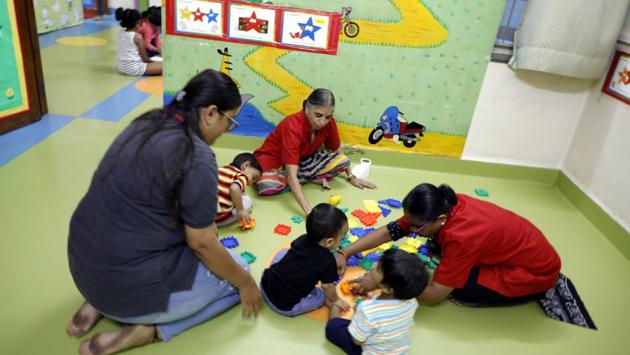Absence of government norms make Pune crèches, child day care centres, a free-for-all
Absence of data care centres, crèches in Maharashtra hampering government’s ability to form a policy
Although breastfeeding has been strongly recommended by medical experts for infants and babies up to the age of two years, this tradition is being lost, especially among a large number of working mothers keeping their infants in crèches and day care centres.

Anecdotal evidence suggests that the rapidly expanding towns and cities in Maharashtra, including Pune, have seen rising numbers of crèches for infants as small as three months to Day Care Centres (DCC) for older children up to the age of 10 years or more.
Sandhya Nagarkar, deputy commissioner, Integrated Child Development Services (ICDS), Maharashtra, under the ministry of women and child development, acknowledged that there was an absence of data on the number of day care centres and crèches in Maharashtra.
She accepted that no rules and regulations were in place to start these centre for child care. “Currently, no such rules are there for registration of crèche or day care centres,” she said, accepting that anybody could start a crèche or day care centre without any formalities or training on issues relating to hygiene, first-aid, importance of breast feeding and nutrition.
Monthly charges at these centres range from Rs. 1,000 per hour to Rs 5,000 per hour.
A visit to 10 Day Care Centres (DCC) revealed poor awareness about the World Health Organisation’s (WHO) Infant and Young Child Feeding (IYCF) programme which strongly recommends that babies should be breast-fed till two years of age.
WHO has pointed out that micronutrient deficiency is a major contributor to childhood morbidity and mortality and the IYCF programme has therefore emphasised on breast-feeding.
Anjali Kulkarni who works as a software engineer and whose 18-month-old daughter goes to a day care centre said, “I have to leave my child at the day care centre as I have to work from 9 am to 5 pm. I am aware that breast-feeding is necessary.”
However, said Anjali, it was not possible for her to breast-feed her child as she was away at work. Also, the day care centre managers discouraged her from continuing with breast-feeding as that would be difficult for her and the DCC to manage.
Another lady on condition of anonymity said DCC managers were not enthusiastic even when told that she would provide them with breast milk in a bottle which could be fed to her baby in the afternoon.
During a visit to the Happy Feet Day Care Centre at Law College Road, Pune, 7-8 children from one to four years old were playing on the floor in an empty room.
Deepa Kulkarni who runs the centre said, “I have 10 children below the age of two years and none of their mothers come for breast-feeding. The purpose of the Day Care Centre is help mothers discontinue breast-feeding. If I allow it, it will disturb the routine of the centre.”
Vaishali Valhekar who runs the Kilbil Day Care Centre at Nanded City, Sinhgad Road, advised that mothers should start giving regular milk instead of breast milk once a child is 18 months old. “No mother comes here for breast-feeding their child,” she said. This day crèche has seven children in its care.
Manasi Kulkarni who runs Little Homes crèche at Kothrud, said she has 10 babies from three months onwards in her care, including seven babies up to two years of age.
Complete absence of data on day care centres, crèches
Sandhya Nagarkar, deputy commissioner, Integrated Child Development Services (ICDS), Maharashtra, run by the ministry of women and child development, accepted that no rules and regulations were in place to start crèche or day care centre. She said, “Currently, no such rules are there for registration of crèche or day care centres.”
Thus, anybody can start a crèche or day care centre without any formalities or training on issues relating to hygiene, first-aid, importance of breast feeding and nutrition.
Nagarkar and other experts said there was an absence of data on the number of day care centres and crèches in Pune and Maharashtra. In the absence of regulation and monitoring, there was no control over the charges levied by these child care centres.
World Health Organisation recommendations
The World Health Organisation’s (WHO) Infant and Young Child Feeding (IYCF) programme recommends that babies (6-23 months) should be given breastfeeding, diverse micronutrients and complementary food.
After six months, breast milk is no longer enough to meet nutritional needs of infants and complementary feeding with diverse micronutrients is necessary. After six months, appropriate, fresh, hygienically prepared, homemade, mashed and soft complementary foods should be introduced, IYCF states.
National Family Health Survey (NFHS-4)
According to NFHS-4, only 64% babies are breast-fed till two years while only 7% babies get food as prescribed by WHO. NFHS says, 55% babies (9-23 months) don’t consume Vitamin A rich food, 83 % don’t consume iron rich food. 34% of below age kids are stunted ()low height for age), 26 % wasted (low weight for age), 7% severely wasted, 36% are underweight and over 40% are anaemic. As per NFHS, 34% babies are stunted, 26% are wasted and 23% are underweight while over 50% are anaemic.



